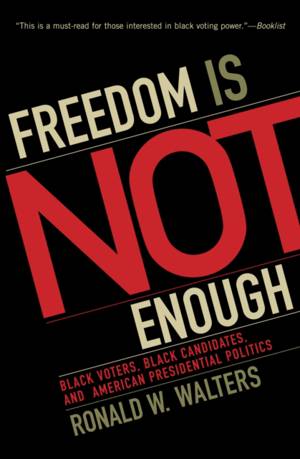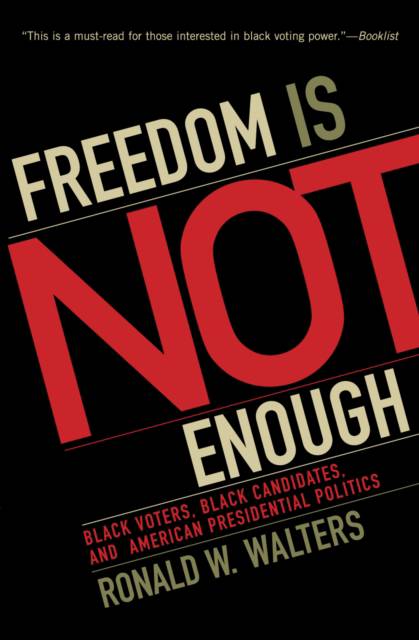
Bedankt voor het vertrouwen het afgelopen jaar! Om jou te bedanken bieden we GRATIS verzending (in België) aan op alles gedurende de hele maand januari.
- Afhalen na 1 uur in een winkel met voorraad
- In januari gratis thuislevering in België
- Ruim aanbod met 7 miljoen producten
Bedankt voor het vertrouwen het afgelopen jaar! Om jou te bedanken bieden we GRATIS verzending (in België) aan op alles gedurende de hele maand januari.
- Afhalen na 1 uur in een winkel met voorraad
- In januari gratis thuislevering in België
- Ruim aanbod met 7 miljoen producten
Zoeken
Freedom Is Not Enough
Black Voters, Black Candidates, and American Presidential Politics
Ronald W Walters
€ 44,45
+ 88 punten
Omschrijving
Black voters can make or break a presidential election-look at the close electoral results in 2000 and the difference the disenfranchised Black vote in Florida alone might have made. Black candidates can influence a presidential election-look at the effect that Jesse Jackson had on the Democratic party, the platform, and the electorate in 1984 and 1988, and the contributions to the Democratic debates that Carol Moseley Braun and Al Sharpton made in 2004. American presidential politics can't get along without the Black vote-witness the controversy over candidates' appearing (or not) at the NAACP convention, or the extent to which candidates court (or not) the Black vote in a variety of venues. It all goes back to the Voting Rights Act of 1965 which formally gave African Americans the right to vote, even if after all these years that right is continuously contested. In Freedom Is Not Enough (a quote from Lyndon Johnson's 1965 commencement address to Howard University just before signing the Voting Rights Act), Ron Walters traces the history of the Black vote since 1965, celebrates its fortieth anniversary in 2005, and shows why passing a law is not the same as ensuring its enforcement, legitimacy, and opportunity.
Specificaties
Betrokkenen
- Auteur(s):
- Uitgeverij:
Inhoud
- Aantal bladzijden:
- 256
- Taal:
- Engels
- Reeks:
Eigenschappen
- Productcode (EAN):
- 9780742548060
- Verschijningsdatum:
- 10/01/2007
- Uitvoering:
- Paperback
- Formaat:
- Trade paperback (VS)
- Afmetingen:
- 167 mm x 226 mm
- Gewicht:
- 362 g

Alleen bij Standaard Boekhandel
+ 88 punten op je klantenkaart van Standaard Boekhandel
Beoordelingen
We publiceren alleen reviews die voldoen aan de voorwaarden voor reviews. Bekijk onze voorwaarden voor reviews.









